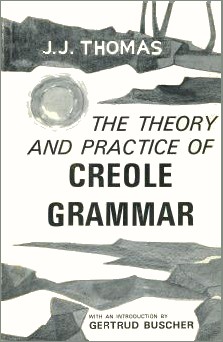|
The theory and practice
of creole grammar / J. J. Thomas ; introduction by
Gertrud Buscher. - London : New Beacon books, 1969. - XVIII-VIII-135 p. ;
19 cm.
|
|
DESCRIPTION : The Theory and Practice of Creole Grammar
was first published in Port of Spain, Trinidad, in 1869. Thomas was one
of the first anywhere to make a study of Creole, recognising this as a
new and important developing language. It was a marriage of French and
African forms — a parallel, as Thomas thought to the
development of the Romance languages from their Latin stem after the
Roman Empire had broken up and barbarian peoples had begun to remould
Latin according to their own verbal rhythms. The importance of his work
was recognised by contemporary philologists and he was elected a member
of the Philological Society in London.
|
GEORGE PADMORE INSTITUTE : The Theory and Practice of Creole Grammar
provided the first overview of French-inflected Creole in the
Caribbean. It considers Creole as a language in its own right marrying
French and African forms, rather than « only mispronounced
French ». New Beacon's reprint of John Jacob Thomas's ground
breaking book was based on a facsimile reprint of the original 1869
text published by Chronicle Publishing, Port of Spain.
[…]
→ présentation et analyse à lire sur le site du George Padmore Institute.
|
RAPHAËL CONFIANT : [L'étude] du Trinidadien
John Jacob Thomas [comme celles du Guadeloupéen René
de Poyen-Bellisle (1890) ou de la Martiniquaise Elodie Jourdain
(1951)], entre autres, ne [manquait] certes pas d'intérêt
mais se [caractérisait] soit par un conformisme de mauvais
aloi soit par une trop grande dépendance à l'endroit
de la tradition grammaticale européenne peu adaptée
à l'analyse de langues qui, comme les créoles,
ne relèvent pas de la seule influence européenne
mais aussi d'apports amérindiens et ouest-africains ainsi
que d'innovations qui leurs sont propres.
☐ Espace
Créole, n° 9 (1999),
Introduction (p. 9)
|
| EXCERPT |
(…)
In
the course of the linguistic studies with which I occupied my leisure
hours, when a Ward-school teacher, at a distant out-station, I turned
my attention to our popular patois, for the purpose of ascertaining its
exact relation to real French ; and of tracing what analogies of
modification, literal or otherwise, existed between it and other
derived dialects. These investigations, though prosecuted under the
disadvantage of a want of suitable books (which as regards Creole was
absolute, and as regards French nearly so), were not altogether
fruitless. For I managed to discover, at least in part, the true nature
and status of the Creole, in its quality of spoken idiom. Moreover,
finding that the Creole, considered in its relation to correct French,
exhibits the whole derivative process in actual operation, (and not in
fixed results, as is the case in older and more settled dialects,) I
thought that a grammar embodying these facts would be useful, as a
basis of induction and comparison, to Creole-speaking natives who may
desire to study other languages etymologically. Still, it must be
confessed that these opinions would not, of themselves alone, have
induced me to publish this book — a result brought about by
considerations having a wider and more urgent importance, and
bearing upon two cardinal agencies in our social system ; namely,
Law and Religion. I might have added Education ; but as I mean to
treat separately of the nullifying effects of the patois on English
instruction among us, I shall say no more on the matter here.
(…)
☐ Preface, pp. III-IV |
|
|
COMPLÉMENT
BIBLIOGRAPHIQUE
- « The theory and
practice of creole grammar », Port-of-Spain :
The Chronicle publishing office, 1869
|
|
| mise-à-jour : 4 septembre 2017 |
 V V | |
|